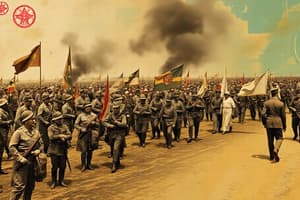Podcast
Questions and Answers
Where was the Western Front of WWI located?
Where was the Western Front of WWI located?
- From Belgium to Switzerland (correct)
- From England to Spain
- From France to Italy
- From Russia to Germany
What military technology was introduced during WWI that contributed to the prevalence of trench warfare?
What military technology was introduced during WWI that contributed to the prevalence of trench warfare?
- Cavalry
- Machine Guns (correct)
- Archers
- Battleships
Which empire was involved in conflict with Britain and its allies in the Middle Eastern theater of WWI?
Which empire was involved in conflict with Britain and its allies in the Middle Eastern theater of WWI?
- Roman Empire
- Ottoman Empire (correct)
- Byzantine Empire
- Mongol Empire
When was the Treaty of Versailles signed?
When was the Treaty of Versailles signed?
What new military tactics resulted from the introduction of tanks during WWI?
What new military tactics resulted from the introduction of tanks during WWI?
What significant organization was formed as a result of the Treaty of Versailles?
What significant organization was formed as a result of the Treaty of Versailles?
What were some of the key factors contributing to the origins of World War I?
What were some of the key factors contributing to the origins of World War I?
Which event is often considered the catalyst that sparked World War I?
Which event is often considered the catalyst that sparked World War I?
Who were the major players in World War I known as the Great Powers?
Who were the major players in World War I known as the Great Powers?
Which term describes the rigid system of military alliances prior to World War I?
Which term describes the rigid system of military alliances prior to World War I?
What was the name of the two major blocs competing before World War I?
What was the name of the two major blocs competing before World War I?
Which country joined World War I in 1917 and played a significant role in shaping the conflict?
Which country joined World War I in 1917 and played a significant role in shaping the conflict?
Flashcards are hidden until you start studying
Study Notes
Exploring the History of World War I
World War I (WWI) marked a pivotal moment in global history, reshaping political dynamics, cultural identities, and military strategies for generations to come. This conflict didn't just unfold in a single, dramatic event but evolved over years of tangled alliances, rising nationalism, and militarism. To fully grasp WWI, let's delve into some of its most important aspects.
Origins and Causes
The roots of WWI are complex and multifaceted, but key factors include imperialistic rivalries, nationalism, and the rigid system of military alliances known as the "balance of power." The assassination of Archduke Franz Ferdinand of Austria-Hungary in 1914 provides a convenient starting point for the war, but the underlying tensions had been brewing for decades. The two major blocs, the Triple Entente (France, Britain, and Russia) and the Triple Alliance (Germany, Austria-Hungary, and Italy), had been competing for economic and territorial gains across the globe.
The Great Powers
The major players of World War I were primarily European nations, including Germany, Austria-Hungary, Russia, Britain, France, and Italy. These Great Powers along with the United States, which entered the war in 1917, shaped the course of the conflict and would eventually define the subsequent peace settlements. It's also noteworthy that the Ottoman Empire, another Great Power, was a significant player in the Middle Eastern theater.
The Fronts
WWI was fought on multiple fronts across Europe, Africa, and the Middle East. The Western Front, which stretched from Belgium to Switzerland, was one of the most famous; this was where the opposing forces of the German and Allied powers faced off. The Eastern Front saw fighting between the Russian and German Empires, while the Italian Front became known for its intense trench warfare. The Middle Eastern theater, often overlooked, saw the Ottoman Empire's conflict with Britain and its allies.
The Impact of Technology
WWI marked a crucial turning point in military technology, with the advent of machine guns, tanks, and the use of poison gas. These innovations, while having devastating consequences, also led to new military and tactical strategies. For example, the trench warfare that dominated the Western Front was a direct result of the new challenges posed by machine guns.
The End of the War
The war dragged on for four long years, inflicting unimaginable suffering on millions. The signing of the Treaty of Versailles on June 28, 1919, marked the official conclusion of WWI. This treaty imposed heavy penalties on Germany, but it also laid the groundwork for future political developments, including the rise of fascism and the formation of the League of Nations.
The impact of WWI extends well beyond its immediate consequences. The conflict reshaped the global landscape, introduced new military technologies, and gave rise to enduring political, economic, and cultural legacies. As we delve into the history of World War I, it's essential to remember the human cost of the conflict, as well as the complex interplay of factors that led to its outbreak and eventual conclusion.
Studying That Suits You
Use AI to generate personalized quizzes and flashcards to suit your learning preferences.




